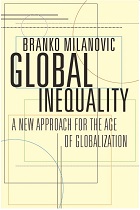Migrations
Will labour remain different from the other factors of production?
|
When it comes to labour and migration, global governance of almost any kind is missing. By contrast, global institutions exist that deal with economic development (the World Bank), balance of payments and international debt (the International Monetary Fund), health (the World Health Organization), trade, including in intellectual property rights (the World Trade Organization), central banks (the Bank for International Settlements), and now regional trade (the Atlantic and Pacific trade agreements). When it comes to labour, the International Labour Organization, which is the oldest among the institutions mentioned here, has little power and deals mostly with national labour rules.
The International Organization for Migration is a keeper of accounts and statistics, duly following all catastrophes, rather than a policy-setter. The reason for this lack of multilateral institutions regarding labour and migration is obvious: the rich and powerful countries have no interest in raising the issue. But ignoring the problem by following an ostrich policy is becoming more difficult as globalisation makes people more aware of the glaring differences in national standards of living, and physical distance is much less of an obstacle than ever before. Europe, faced by an exodus from Africa, and more recently from the Middle East and the Indian sub-continent, will be perhaps the first to begin defining a multilateral policy on the movement of people. However, unlike what is envisaged now (multilateralism among EU members only), such a policy needs to include the sending countries as well. A world of more orderly migration, and of quotas at the level of both the sending and the recipient countries, should be the goal.
In order for such a change to become feasible, we need to change the binary character of the current rules for national citizenship. With some exceptions, citizenship today confers on the person who obtains it the same rights and duties as are enjoyed by all other citizens. It is that binary nature of citizenship that makes current citizens reluctant to share their “citizenship rent” with migrants: in monetary terms, the citizenships of rich countries are very valuable. Physical walls between jurisdictions are being built, in part, because there is a huge financial wall between being and not being a citizen of a rich country. But citizens of rich countries might be more open to foreign migration if this financial wall could be lowered through the introduction of an intermediate level of citizenship that would be less valuable (because, for example, it might involve higher taxation, lower access to social services, or an obligation to return to work in one’s country of origin at periodic intervals). A policy such as this would bring globalisation to the forgotten factor of production, labour, and through migration would lower global poverty and inequality. For this to happen, two changes are essential: (1) the redefinition of citizenship, and (2) multilateralism involving sending and recipient countries.
But even if migration were to become more common than it is today, it is still extremely unlikely that the change would be so momentous as to lead to fully open borders and a situation whereby GDP growth rates of poor countries would become unimportant because people could just leave whenever they wanted to. Thus, the growth of poor nations will remain of crucial importance.
Extract with the author’s permission from Branko Milanovic (2016), “Global Inequality: A New Approach for the Age of Globalization”, Belknap Press, pages 230-232.
OECD work on employment ©OECD Yearbook 2017. See www.oecd.org/forum/oecdyearbook |
Branko Milanovic Graduate Center, City University of New York and Author
© OECD Yearbook
|
Documents connexes

